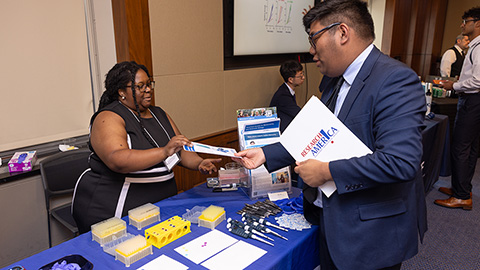ASBMB cautions against drastic immigration fee increases
The American Society for Biochemistry and Molecular Biology sent recommendations to the U.S. Citizenship and Immigration Services related to the agency’s proposed changes to petition processing fees. The USCIS proposed increasing its filing fees for employment-based visas by up to 2,050%, a measure intended to remedy financial deficits at USCIS and ramp up hiring to improve services. The ASBMB expressed concern about how “the proposed rule is likely to harm the retention of highly skilled foreign-born scientific researchers.”
The society made three recommendations:
-
Reevaluate the Asylum Program Fee
-
Phase in scheduled fee increases
- Eliminate petition and visa backlogs
“It’s important for the scientific community to be engaged in topics like proposed changes to the visa process because the U.S. research enterprise relies and thrives on attracting foreign-born scientists and students,” said Sarina Neote, public affairs director for the ASBMB. “This compelled us to work with our committee members to submit a response to USCIS; scientists must be represented in these vital policy decisions.”
Immigrant scientists make up more than half of STEM graduate students and the doctoral-level scientific workforce in the United States.
“(T)he current visa process makes it difficult for them to remain in the U.S. to work and contribute to the U.S. economy after their research training is complete,” the society wrote. “This squanders the substantial investment made in these scientists by the U.S. research enterprise and contradicts their tremendous value to U.S. competitiveness and innovation.”
The proposed changes include instituting a $600 Asylum Program Fee to be paid by employers for each I-129 or I-140 petition. The ASBMB expressed concern that this fee may burden nonprofit research organizations disproportionally. The society wrote: “While for-profit companies are likely to easily absorb this additional filing cost, nonprofit organizations and educational institutions are more financially constrained.”
The society emphasized that this asylum fee will be particularly burdensome for academics as temporary grants rarely align with visa-processing timelines. This misalignment often requires multiple submissions of I-129 and I-140 petitions as employees secure additional federal grants. Industry scientists do not typically have funding restrictions. Rather than burden the nation’s brightest and their nonprofit employers, the ASBMB recommended that USCIS seek more federal funding to cover these costs.
“(T)he ASBMB is concerned that the $600 Asylum Program Fee will deter institutes of higher education and other nonprofit research organizations from supporting I-129 and I-140 petitions for their employees,” the society wrote. “This could increase the barriers to retaining scientific talent in the U.S. research workforce at a time when U.S. competitiveness is crucial for the nation to remain a global leader in technology and innovation.”
In addition, the society cautioned against instituting immediate fee increases as this would financially hinder many organizations. Instead, the ASBMB suggested that, if fee increases are necessary, then the USCIS should phase them in over multiple years to allow STEM organizations to adjust their budgets.
Finally, the ASBMB called upon the USCIS to use any new funds raised by fee increases to “remove backlogs, combat fraudulent activity, and reduce processing times that currently burden temporary visa holders in the U.S. scientific workforce.” Some consulates have student visa backlogs approaching one year long, which can prevent foreign-born scientists from completing their education and training in the U.S. thus harming the bioeconomy.
Enjoy reading ASBMB Today?
Become a member to receive the print edition four times a year and the digital edition monthly.
Learn moreGet the latest from ASBMB Today
Enter your email address, and we’ll send you a weekly email with recent articles, interviews and more.
Latest in Policy
Policy highlights or most popular articles

Embrace your neurodivergence and flourish in college
This guide offers practical advice on setting yourself up for success — learn how to leverage campus resources, work with professors and embrace your strengths.

ASBMB honors Lawrence Tabak with public service award
He will deliver prerecorded remarks at the 2025 ASBMB Annual Meeting in Chicago.

Summer internships in an unpredictable funding environment
With the National Institutes of Health and other institutions canceling summer programs, many students are left scrambling for alternatives. If your program has been canceled or delayed, consider applying for other opportunities or taking a course.

Black excellence in biotech: Shaping the future of an industry
This Black History Month, we highlight the impact of DEI initiatives, trailblazing scientists and industry leaders working to create a more inclusive and scientific community. Discover how you can be part of the movement.

ASBMB releases statement on sustaining U.S. scientific leadership
The society encourages the executive and legislative branches of the U.S. government to continue their support of the nation’s leadership in science.

ASBMB and advocacy: What we accomplished in 2024
PAAC members met with policymakers to advocate for basic scientific research, connected some fellow members with funding opportunities and trained others to advocate for science.

